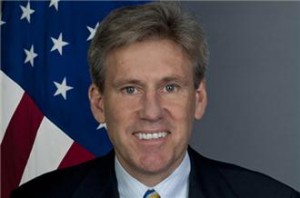Twenty Years of Continuity
Last night, the US killed Qassem Suleimani in a targeted killing on Iraqi soil. DOD claimed they killed him in a “defensive” move to stop his plotting against US diplomats. Nancy Pelosi already made clear that Trump did not properly brief Congress (though Lindsey Graham says he got briefed while golfing at Mar a Lago).
Most experts fear this will escalate (indeed, recent events resemble a Colin Kahl think piece about how the US and Iran could escalate into a war without meaning to). That’d be bad enough under a sane president, with competent advisors. But Trump has fired most of the experts in his White House and has been pardoning war criminals (and is thinking of pardoning more). Which means we may well be mobilizing service members to fight for a Commander in Chief they can’t expect to think through the use of force, but who has already demanded that his subordinates violate norms and laws partly because he has a temper problem and partly because he doesn’t understand how slow negotiation and strategy works.
But I also feel like this moment has been coming for twenty years, enabled by people who disdain Trump but nevertheless get treated as sane.
There’s our response to 9/11, which people on both sides of the aisles believed was license to break all the rules the US had claimed to adhere to since World War II. We embraced torture because some of the most experienced policy makers ever claimed to be at a loss to know how to respond to a threat they had been warned about. Yet those policy makers knew how to work the system, to have in-house lawyers write up OLC memos excusing the crimes in advance.
Then there’s the Iraq War, the forever stain. Those same experienced policy makers used the opportunity of 9/11 to launch a war of a choice, and then bungle it, in part out of the same impatience and imperiousness policy elites now criticize Trump for, in part by putting incompetent ideologues in charge of cleaning up the mess.
Along the way, we used tools meant to fight terrorism as a way to villainize Iran, in part because the Neocons wanted to avoid political negotiation with Iran at all costs and in part because figuring out a way to deal with Iran’s willingness to use proxies was too difficult otherwise.
It didn’t really get better with Obama. When faced with the challenge of an American citizen inciting attacks, Anwar al-Awlaki, he carried out a sustained effort to kill him using the same kind of targeted kill that Trump just used, excused by yet more shoddy OLC memos.
It seemed so easy, he did it again to take out Osama bin Laden, in a made-for-campaign-season strike that didn’t do much to address terrorism but did expand our claims to operate on other countries’ sovereign territory.
Then there was Libya, where the US made certain agreements to limit the action against Qaddafi, only to violate them and leave the country in chaos.
The Republicans’ cynical sustained response to Benghazi, yet another made-for-campaign-season event, made it their party line stance that any attack on the US must be met by a show of dick-wagging and force, regardless of the efficacy. Trump even made that stance a key part of his nominating convention. Benghazi-palooza made a response like yesterday’s targeted killing inevitable, even though a bunch of the same Republicans recognize that Trump doesn’t understand the fire he’s playing with.
Behind it all is a belief that the most powerful nation in the world shouldn’t have to tolerate any resistance to its power, and may break rules and norms — to say nothing of causing untold chaos in other places — to quash it. Purportedly sane mainstream politicians set the precedent that it was okay to commit war crimes as a misguided shortcut in defending America. A Nobel Prize winner normalized assassination. And both parties have enabled events and legal arguments that leave Trump with few restraints.
And yet the chattering classes will pretend this is something new with Trump.


